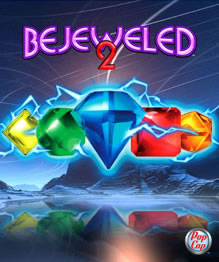
Bejeweled 2 is a tile-matching puzzle video game developed and published by PopCap Games. Released as a sequel to Bejeweled, Bejeweled 2 introduces new game mechanics, such as Special Gems and extra game modes, along with new visuals and sounds.

Chuzzle is a tile-matching puzzle video game developed by American studio Raptisoft Games and published by PopCap Games. The game involves connecting three or more fuzzballs named Chuzzles.

Where's My Water? is a puzzle video game developed by American studio Creature Feep and published by Disney Mobile, a subsidiary of Disney Interactive Studios. Released for desktop web browsers and devices using iOS, Android, Windows Phone and BlackBerry 10 operating systems, the game has its players route a supply of water to an alligator. Where's My Water? has been praised for its gameplay and its graphical style, with special recognition of its lead character, Swampy, the first original Disney character for its mobile game portfolio, voiced by actor, Justin T. Bowler.

Fishdom is a puzzle game developed by Playrix for Microsoft Windows, Mac OS, Nintendo DS, Nintendo 3DS, Android, iOS, and iPadOS. The game was launched 18 June 2008.

Cogs is a puzzle video game released in 2009 by Lazy 8 Studios, originally released as a Microsoft Windows title, but receiving subsequent ports to other operating systems, mobile platforms, and game consoles. The game requires the player to manipulate a three-dimensional object's sides as sliding block puzzles as to complete specific goals, such as meshing gears to complete a clockwork mechanism or routing gas flow through pipes to a balloon.

Jetpack Joyride is a 2011 side-scrolling endless runner action video game created by Halfbrick Studios. It was released for iOS devices on the App Store on September 1, 2011 and has been ported to other systems. It was released online as a Flash version on May 11, 2012; on Android on September 28; on PlayStation Portable on November 20 in North America and November 21 in Europe; on BlackBerry PlayBook on December 13, 2012; on PlayStation 3 and PlayStation Vita on December 21 in Europe and December 31 in North America; on BlackBerry 10 on March 6, 2013; and on Windows Phone 8 and Windows 8 on June 5. It was also released on PlayStation 4 on April 26, 2016. A mobile version using the keypad was released in 2021 for KaiOS devices.
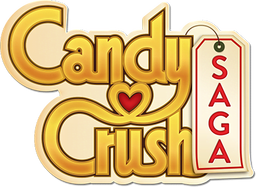
Candy Crush Saga is a free-to-play tile-matching video game released by King on April 12, 2012, originally for Facebook; other versions for iOS, Android, Windows Phone, and Windows 10 followed. It is a variation of their browser game Candy Crush.

Puzzle & Dragons is a puzzle video game with role-playing and strategy elements, developed and published by GungHo Online Entertainment for the iOS, Android, and Amazon Fire platforms.
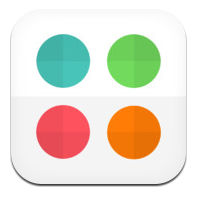
Dots is a free mobile game produced by Betaworks and developed at American studio Playdots, Inc. It was released on April 30, 2013 for iOS and on August 15, 2013 for Android. It has both a single player and online multiplayer modes. A single-player sequel, Two Dots, was released on May 29, 2014.

Jelly Splash is a match-three puzzle video game released by the developer Wooga on 15 August 2013 on iPad and iPhone. It was later released on Facebook and Android, as well as the Korean social network platform KakaoTalk in November 2013.

The Groove Coaster series is an iOS / Android and arcade rhythm game franchise developed by Matrix Software and published by Taito. The first Groove Coaster was released for iOS on July 28, 2011. This rhythm game follows a roller coaster type track on screen, where players must make the appropriate controller inputs. Like many rhythm games, a life bar is attached to the game play. Players gain or lose points on the bar depending on the input timings.

Hitman Go is a turn-based puzzle video game developed by Square Enix Montréal and published by Square Enix's European subsidiary. Announced in February 2014, the game was released for iOS in April 2014 and for Android in June 2014. Windows and Windows Phone versions were released the following year in April 2015. In February 2016, a "Definitive Edition" version was released on PlayStation 4, PlayStation Vita, and on Linux and Windows via Steam. It is the first game developed by Square Enix Montréal, a studio founded in 2011. Development entered full production in 2013 and was completed by eleven people using the Unity game engine.

Letters of Gold is a word puzzle game released by Brazilian studio Cupcake Entertainment in October 2013 for Facebook. In March 2015, the game reached 400 levels. The game is periodically updated, adding new "episodes" and levels.
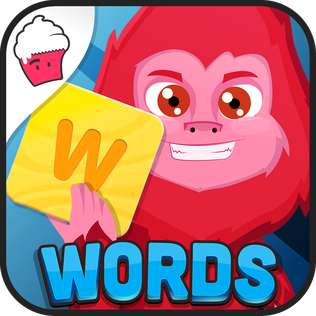
Words of Gold is a multiplayer word game developed by Cupcake Entertainment. It was released in November 2014 for Facebook, December 2015 for Android, and February 2016 for iOS.

Magic: The Gathering – Puzzle Quest is a puzzle video game that combines the gem-matching concept in Puzzle Quest and its sequels, with the collectible card game aspects of Magic: The Gathering. It was released for mobile systems in December 2015.

Flow Free is a puzzle game developed and published by American studio Big Duck Games for iOS and Android in June 2012. As of 2022, the original game has received more than 100 million downloads, with its various variants receiving additional millions more.

Puzzle Fighter was a free-to-play competitive puzzle video game for Android and iOS devices, which is developed by Capcom Vancouver and published by Capcom. It is the successor to 1996's Super Puzzle Fighter II Turbo, and features playable characters from various Capcom franchises. The game launched in November 2017 and was discontinued in July 2018.
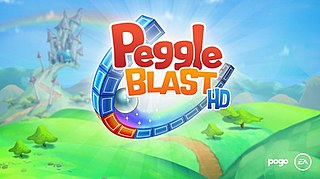
Peggle Blast is a casual puzzle video game developed by PopCap Games and published by Electronic Arts in the Peggle franchise. Released on December 2, 2014, to Android and iOS, it is the second game in the franchise released to mobile, the first being a port of Peggle. Blast was exclusively available on Google Play Store and App Store until its release to web browsers as Peggle Blast HD on March 31, 2020. Electronic Arts announced Blast in late 2014.
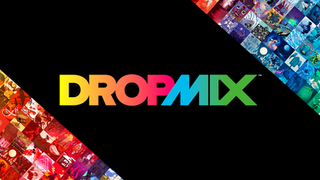
DropMix was a music mixing game developed by Harmonix and published by Hasbro, no longer supported in either iOS or Android app stores. The music servers have been taken offline rendering the game unplayable. The game used a mix of physical cards with chips embedded with near field communication, a specialized electronic game board with NFC and Bluetooth capabilities, and a companion application for mobile devices that communicates with the board via Bluetooth. By playing a card, representing a specific song, atop a proper board space, the board will detect its NFC code and relay that to the app, which will play a sample from that song, such as a drum loop or a vocal section. With multiple cards on the board, the app will manage how all the current songs are mixed as played through the app, creating a mashup. The game has several game modes for single and multi-player play, and additional cards, featuring more song samples, can be purchased as booster packs.

Marvel Strike Force is a turn-based role-playing mobile game by FoxNext for Android, iOS, and iPadOS platforms. The game was launched worldwide on March 28, 2018, and is primarily set in the Marvel Universe.



















